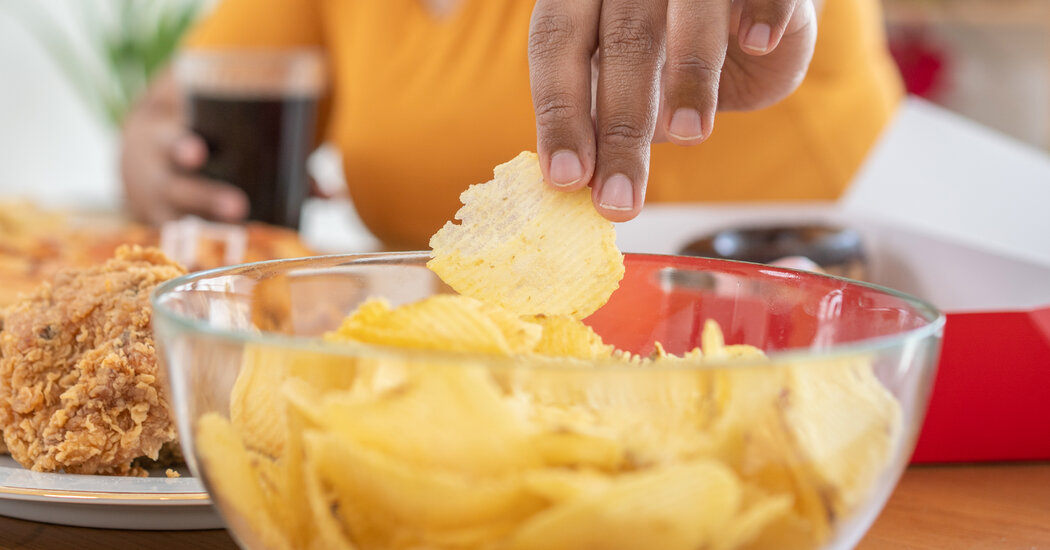
About 15 years ago, Dr. Andrew T. Chan, a gastroenterologist at Mass General Brigham in Boston, noticed that more of his colorectal cancer patients were skewing younger than usual. Some were in their 20s, 30s and 40s compared with his more typical patients in their 60s and 70s.
His observation was part of an alarming trend that experts are now racing to understand: Colorectal cancer rates have been mysteriously climbing among people under 50. In a study published today in JAMA Oncology, Dr. Chan and his colleagues suggest that ultraprocessed foods — which have increased in our diets over the decades — may be playing a role.
He and his team looked at women in their 20s, 30s and 40s. Those who ate more ultraprocessed foods had higher risks of developing precancerous colorectal polyps — abnormal clumps of cells that grow in the colon or rectum and can develop into cancer — before they turned 50 compared with those who consumed fewer. Ultraprocessed foods include sugary sodas, processed meats, candies, chips and other products made with ingredients you wouldn’t typically find in a home kitchen.
The study was large and was the first to look at how ultraprocessed foods may influence the development of colorectal polyps in people under 50, said Dr. Y. Nancy You, a colorectal surgeon at the University of Texas MD Anderson Cancer Center in Houston, who was not involved with the research. The findings add important context to the larger question of why colorectal cancer rates are rising in younger people, she said.
But the study also had limitations, Dr. You cautioned. While it found an association between ultraprocessed foods and precancerous polyps, it could not directly prove that eating the foods caused the growths.
What the New Study Concluded
From 1991 to 2015, researchers followed more than 29,000 female nurses who were in their mid-20s to early 40s at the start of the study. The nurses filled out detailed dietary questionnaires every four years, and all of them had at least one colonoscopy before age 50.
The scientists found that the nurses who consumed the most ultraprocessed foods (about 10 servings per day) were 45 percent more likely to have the most common type of precancerous polyp, called a conventional adenoma, than those who consumed the least (about three servings per day). The main types of ultraprocessed products they consumed were sliced breads and breakfast cereals; packaged sauces, spreads and condiments; and sugary or artificially-sweetened drinks.
Having this type of polyp doesn’t guarantee that you’ll develop colorectal cancer, but it does increase your risk, Dr. Chan said.
One limitation of the study was that it was performed on a very specific group of people — female nurses, most of whom were white — so it will need to be replicated in others, said Dr. Robin Mendelsohn, a gastroenterologist at Memorial Sloan Kettering Cancer Center in New York City who was not involved with the research.
And it was challenging for the researchers to determine if certain foods (like waffles, pies and popcorn) were technically ultraprocessed or made from scratch, which could make the results less reliable, said Marian L. Neuhouser, a nutritional epidemiologist at Fred Hutch Cancer Center in Seattle who was not involved with the research.
Still, the conclusion does track with recent research on adults of all ages. A handful of studies from the last five years have consistently found links between diets high in ultraprocessed foods and precancerous polyps and colorectal cancer.
Why Ultraprocessed Foods May Increase the Risk
Researchers don’t know what might account for the link between ultraprocessed foods and colorectal cancer risk. But they do know that consuming ultraprocessed foods can increase the chances of developing obesity and Type 2 diabetes, which are both associated with early-onset colorectal cancer, Dr. Chan said.
Diets high in ultraprocessed foods may also disrupt the balance of “good” and “bad” microbes in the gut and damage the protective lining of the intestines, Dr. Chan said, which may encourage abnormal cells to grow.
Dr. Neuhouser added, however, that there is not enough evidence to suggest that you should avoid the foods completely. In fact, some ultraprocessed foods can provide nutrients associated with a lower risk of colorectal cancer — including certain yogurts (which provide calcium) and whole grain breads and breakfast cereals (which contain fiber). “We think of those as protective foods,” Dr. Neuhouser said.
Researchers are also looking into other potential explanations for rising colorectal cancer rates among younger adults, including antibiotic use and exposure to microplastics and “forever chemicals.” This isn’t “a single smoking gun disease,” Dr. You said.
So while you don’t need to cut out ultraprocessed foods completely, Dr. Mendelsohn did suggest limiting them if you can. You can also reduce your risk of developing colorectal cancer by getting adequate exercise, not smoking, limiting alcohol and red and processed meats, and eating plenty of fruits and vegetables.
But, Dr. Mendelsohn added, “even people who do all of the right things still develop colon cancer.” Genetics also influence risk.
That’s why it’s important to get screened for colorectal cancer starting at age 45 — or sooner if you have a family history, Dr. You said. With a colonoscopy, your doctor can remove any precancerous polyps, “so that they never actually turn into cancer,” she said.
Alice Callahan is a Times reporter covering nutrition and health. She has a Ph.D. in nutrition from the University of California, Davis.
The post Ultraprocessed Foods Linked to Colorectal Cancer Risk in Women Under 50 appeared first on New York Times.



